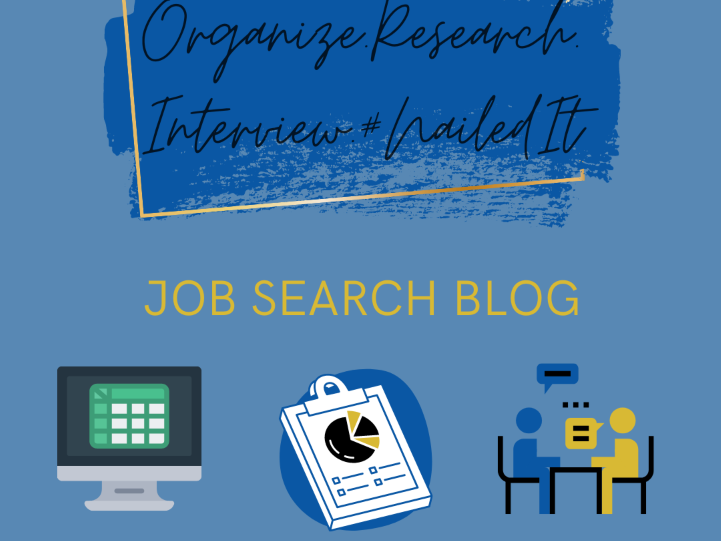
Organize. Research. Interview. #NailedIt
Career and Workforce Development New Professionals and Graduate Students Graduate New Professional
January 5, 2021
The job search in student affairs has typically been a stressful process for graduate students and new professionals, but has become especially stressful during the time of COVID. Feelings of uncertainty have increased as institutions have closed, merged, and opted for a completely virtual learning experience. However, the techniques used to prepare for the job search still hold true during these trying times. It should be noted that these are the techniques that I have used during my job searches and that many other techniques exist.
The first part of the job search process is to organize yourself. I like to create a spreadsheet to track the jobs that I have applied for. This spreadsheet typically includes the institution, city, state, position title, functional area, login information, link to posting, references used for position, interview dates, etc. Another way to organize yourself is to engage in self-reflection: what do you value in an employer, what type(s) of institution(s) do you work best at, what functional area(s) are you open to, are you geographically bound? These are just a few questions to consider when looking for institutions and positions to apply to. Last part of my organization is to SET UP MY JOB AGENTS. HigherEd Jobs makes it easy to set up multiple job agents to help you stay on top of your job search. Keep in mind that institutions want to see their position requirements in your resume, make sure that you review your resume and adapt language if necessary.
The second step of the job search is doing research. This is sometimes the tedious part of the job search. When applying for a position, research the institution on multiple levels and how those levels play off of each other and impact the work of the position you are applying for. Ask specific questions about specific programs in your interview, this will make you stand out.
A large majority of the job search process, and sometimes the most challenging, is the interview process. Preparation is key for successful interviewing. Interviews are scary because of the unknown. Remember that securing the interview is a big achievement and you should feel proud! The good news is, many institutions are going to ask questions around similar areas: diversity and inclusion, supervision, conflict management, leadership style, success and challenge, etc. Think about how you would respond to questions around these areas and identify specific examples from your experiences to highlight what you are saying. Rehearse your responses! Some institutions will provide an agenda for your interview day that will provide the names, and sometimes titles, of the people you will be interviewing with. Think of questions that would be appropriately answered by the group. If you are meeting with entry level staff who will be on the same level as you, ask questions about supervision or their experiences. In a session with a director and/or higher level administrators, you may ask questions about strategic planning and future initiatives/programs for the office/division.
After preparing for the interview you are ready to do it! Take a deep breath, it’s okay to be nervous. Remember they are considering you for this position. Have a notebook with you, it’s appropriate to jot down a few notes especially for multiple part questions. Acknowledge what you are doing by saying, “I’m going to write down a quick note as there are multiple parts to your question that I want to address.” You may also write down specific pieces of information shared with you to use in follow-up conversations, questions, and thank you emails. Have your responses rehearsed, but not robotic. During your preparation phase you should have practiced these responses. Be concise and relevant with your answers and examples. Make sure to wrap up your answer by tying back to the original question by saying “…and that is how I believe I embody/demonstrate [quality/characteristic in question].” This will signal to your interviewer(s) that you have completed your thought.
The final step in the job search process is the follow-up you have with your interviewer(s). This is sometimes the most important part because it will make you stand out from other candidates. Try not to do a generic follow-up email. Use your notes to help guide these emails. Maybe a program/initiative/interesting topic came up in a conversation, mention that topic in the email to the person who said it to show that you were invested in the conversation. It’s important to follow-up with staff who supported the process if they are known. For example, you may be contacted to schedule interviews by an executive assistant, but that person is not in the actual interview. It is sometimes best to write these emails the day of your interview and schedule their sending for later in the week. Determine when it would be most appropriate for interviewer(s) to receive this communication. As many institutions share their timelines for position searches with candidates, it is completely appropriate to follow-up with the search committee chair as the final milestone approaches to check in on your candidacy.
Remember that you have options and that you deserve to work at an institution that enhances you personally AND professionally.
Author: Mark Wade (he/him/his) currently serves as a Residence Hall Director at Bowling Green State University and as one of the Co-Chairs for NASPA's New Professionals and Graduate Students Knowledge Community. In his spare time, Mark can be found gardening, binge watching Netflix, and spending three paychecks in one sitting on shoes. Mark can be found on Instagram @mark_wade93.